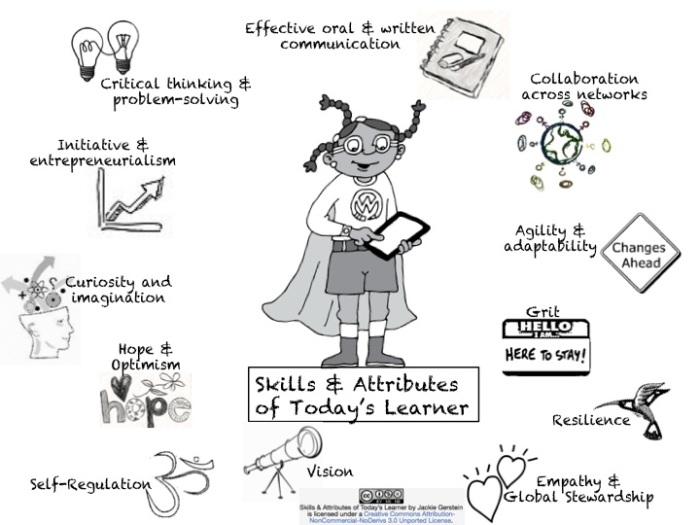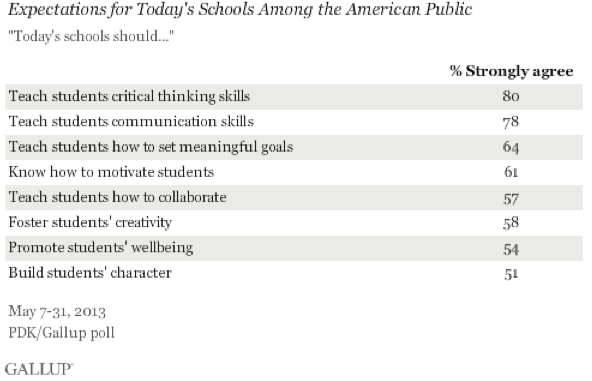The Other 21st Century Skills: Why Teach Them
Many have attempted to identify the skills important for a learner today in this era of the 21st century (I know it is an overused phrase). I have an affinity towards the skills identified by Tony Wagner:
- Critical thinking and problem-solving
- Collaboration across networks and leading by influence
- Agility and adaptability
- Initiative and entrepreneurship
- Effective oral and written communication
- Accessing and analyzing information
- Curiosity and imagination http://www.tonywagner.com/7-survival-skills
This presentation sparked my thinking about what other skills and attributes would serve the learners (of all ages) in this era of learning. Some other ones that I believe important based on what I hear at conferences, read via blogs and other social networks include:
- Grit
- Resilience
- Hope and Optimism
- Vision
- Self-Regulation
- Empathy and Global Stewardship
Why Teach 21st Century Skills
According to a recent (2013) Gallup Poll, Americans Say U.S. Schools Should Teach “Soft” Skills
Americans’ views on what schools should be teaching parallel the opinions of employers, educators, and young people themselves, who are calling for students to be better equipped to analyze information, communicate effectively, and to collaborate with diverse people in a global work environment to solve complex problems.
While student success may depend on mastery of content in core subject areas such as math and reading, it also depends on more than knowledge of core content. Critical thinking, creativity, communication, and other soft skills, as well as student physical and social wellbeing, are also necessary for future success in higher education and in the workplace. Americans Say U.S. Schools Should Teach “Soft” Skills
Most of The Other 21st Century Skills could be classified as social-emotional skills (SEL) and research shows that SEL can have a positive impact on school climate and promote a host of academic, social, and emotional benefits for students. Durlak, Weissberg et al.’s recent meta-analysis of 213 rigorous studies of SEL in schools indicates that students receiving quality SEL instruction demonstrated:
- better academic performance: achievement scores an average of 11 percentile points higher than students who did not receive SEL instruction;
- improved attitudes and behaviors: greater motivation to learn, deeper commitment to school, increased time devoted to schoolwork, and better classroom behavior;
- fewer negative behaviors: decreased disruptive class behavior, noncompliance, aggression, delinquent acts, and disciplinary referrals; and
- reduced emotional distress: fewer reports of student depression, anxiety, stress, and social withdrawal. (http://www.casel.org/social-and-emotional-learning/outcomes)
What Is Typically Taught
There has been, at times, push back for “teaching” what many classify as soft skills (e.g., communication, creativity, social skills). Two points can be made regarding this perspective:
- Curriculum designers, administrators, and educators have determined, subjectively, through directives like No Child Left Behind and Common Core State Standards what students should know.
- Educators do teach these soft skills but often in covert ways.
Curriculum designers, administrators, and educators have determined, subjectively through directives like No Child Left Behind and Common Core State Standards what students should know.
Curriculum developers, administrators, and educators have stated that they do not want to make judgements about what is important to teach in terms of the soft skills, that because they are soft skills, contain too much ambiguity, and as such are subjective. They believe that deciding what to teach in terms of more hard disciplines such as language arts, mathematics, science, and social studies are more objective. The truth, though, is that developing, deciding upon, and choosing standards, curriculum, instructional methods, and assessments is a subjective process. A more dramatic example of this is Texas science deciding to focus on creationism over evolution.
Everything taught at schools is subjective. It becomes deciding what knowledge and skills will best serve students in their out-of-school lives now and in the future.
Educators do teach these soft skills most often in covert ways.
There is push back for teaching soft skills and character education in schools because they are seen as extras, time away from teaching the important “stuff”, too vague, and too personal, culturally based to be taught. But, and this is huge but, soft skills are being taught in schools in covert ways. Raise your hand to talk, walk in line, don’t push, say please and thank you are skills that are often being covertly taught as “good” social-emotional skills. Students are often rewarded for “appropriate” behaviors and punished for “inappropriate” behaviors. Through adding the skills such as those presented in the 21st Century Skills, the teaching of more behavioral, attitudinal, and social skills becomes overt and intentional.
Some Characteristics of The Other 21st Century Skills
- The Other 21st Century Skills are an aggregate of skills. As such . . .
- They are presented in a reductionist manner, as separate skills, to increase understanding of them as constructs. In real life, they are interconnected with a synergistic results – the sum being stronger than the whole. For example, curiosity and imagination increases one’s effectiveness in problem-solving and critical thinking. Grit is increased when one becomes more resilient.
- Thus the focusing on a single one such as grit, resilience, or creativity will not insure any change or growth of the learner. It is a combination of a number of the skills that will increase an individual’s success in life; in success in his or her chosen interest-driven pursuits and workforce focus.
- The Other 21st Century Skills have benefits for all learners, all ages, all socioeconomic levels and ethnic groups:
- The underlying premise is that these skills can assist everyone in increasing the quality of their lives.
- Everyone and anyone can develop and learn these skills.
- As they are viewed as skills, everyone and anyone can increase his or her proficiency.
- The Other 21st Century Skills can be taught, developed, encouraged, and enhanced through:
- Direct Instruction – helping learners develop a cognitive knowledge base and meaning of the skills
- Simulations and Role Modeling – Showing and demonstrating what these skills looks like in actual situations
- Storytelling Through Biographies, News – using both fiction and non-fiction stories that illustrate these different skills.
- Real Life Experiences – asking students to provide evidence of using these skills in their everyday lives.
We are living in probably the most complex and chaotic era of human existence. As such, schools could better serve their students by helping them become creative, innovative, resilient, empathetic human beings as opposed to ones who can ramble out a memorized rote list of states with their capitals or the names of the elements of the periodic chart.
Written by Jackie Gerstein, Ed.D.
February 9, 2014 at 10:42 pm
Posted in Education
Tagged with 21st century skills, disrupting education, Education, learning, social-emotional learning
One Response
Subscribe to comments with RSS.
Leave a comment Cancel reply
This site uses Akismet to reduce spam. Learn how your comment data is processed.



“Grit” isn’t really a skill represented in the literature but more a psychological construct that schools and colleges have started “testing” for and “looking” for, almost linking certain psychological characteristics with success. Although it’s not surprising that students that have been vetted for their ability to persevere in fact do persevere in college and in graduate, it seems contradictory to me to specifically look for students that show signs of this characteristic.
guest
February 11, 2014 at 12:39 pm